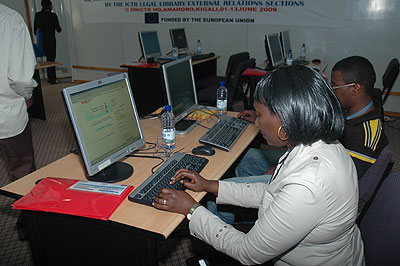Internet services are expected to improve after Seacom restored a broken submarine cable. The cable that provides broadband internet to Africa, suffered a cut on March 22, slowing down internet services throughout the continent.


Internet services are expected to improve after Seacom restored a broken submarine cable. The cable that provides broadband internet to Africa, suffered a cut on March 22, slowing down internet services throughout the continent.This caused internet disruptions for customers and affected the business of Rwandan internet service providers (ISPs) for over a week."We apologise for the impact these multiple cable cuts have caused over the past eight days. The work done by the SEACOM team and our global partners to achieve a massive manual restoration task at a time of much disruption has been outstanding,” Mark Simpson, the chief executive officer of Seacom said in a statement seen by The New Times.Business hindered Letitia Murego, the chief commercial officer of Rwandatel, yesterday told The New Times that the cable cut greatly affected their services over the last one week, which was a challenge to internet users both socially and economically. "Even though we were routed to another back up, it did not help,” she said, adding that such interruptions are costly to business operators because the world today heavily relies on the internet.She was echoed by Antoine Sebera, the Acting Chief Executive Officer of Broadband Systems Corporation, who said the Seacom cable cut had a big impact on their services despite the fact that they were rerouted through other cables. "We have been encountering cable disruptions on several occasions, and it affects our ability to deliver broadband services to our clients,” he noted.Mediterranean submarine cables have suffered disruptions several times in the past few years. These disruptions are usually attributed to accidents involving ship propellers. Last year, the East Africa Submarine Cable System (EASSY) cable suffered cuts between Djibouti and Port Sudan – which carries the majority of international Internet traffic–and caused the breakdown of internet services in East Africa region.However, Jean Baptiste Mutabazi, Head of Communications and Media Regulation at Rwanda Utilities Regulatory Agency, advised ISPs to always tap into available bandwidth of other operators in case of such disaster."If one internet service provider is affected by the disruption on its router, it should be backed up by another operator who is not affected to maintain the smooth operation of internet services to customers,” he noted.Last year, the government issued guidelines where any affected internet operator is required to tap into available bandwidth of other operators at a pre-negotiated price. The arrangement was to see a permanent agreement between telecom operators and ISPs, where by in case one is affected by fibre cut offs, the other can back them up immediately.Rwanda relies on three submarine fibre optic cable systems for the internet traffic connection through local telecommunication companies and ISPs; EASSY, The East African Marine Systems (TEAMS) and SEACOM.


